Emergency numbers
For general emergency / European Emergency Number: 112
For the police: 192
For the fire brigade: 193
For an ambulance: 194
For victims of human trafficking: +381603220086
For free legal assistance: +381648246508
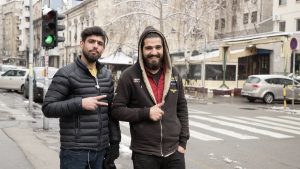
For general emergency / European Emergency Number: 112
For the police: 192
For the fire brigade: 193
For an ambulance: 194
For victims of human trafficking: +381603220086
For free legal assistance: +381648246508
In Serbia, you may be detained or fined for illegal border crossing.
The information below comes from a judge in Subotica Misdemeanor Court and from the Belgrade Centre for Human Rights, which provides more information on this subject at the Asylum Information Database.
Under the law, the Asylum Office can detain you when it needs to:
In practice, the Asylum Office detains asylum seekers extremely rarely. If you are detained, you will be put in the Shelter for Foreigners.
The most frequent reason for placing foreigners there is to ensure their presence as witnesses in criminal proceedings against people suspected of illegally crossing the state border, human smuggling or human trafficking.
In rare cases, instead of placing you in the Shelter for Foreigners, the Asylum Office will limit your freedom of movement, confining you to stay in your asylum center.
The misdemeanor courts can convict you for:
The proceeding can end in following ways:
After you pay the fine or serve your prison sentence, you get an order to leave Serbia within a certain time limit.
You have the right to seek legal help and to get a translator who speaks a language you fully understand.
According to the Asylum Act, you can be detained up to 3 months. This deadline may be extended once for another 3-month period.
How long you are detained depends on:
The court usually gives short prison sentences in illegal border-crossing cases.
Located in Padinska Skela, Belgrade, the Shelter for Foreigners can host up to 70-80 people.
The men’s section has 6 rooms, and the women’s section has 3 rooms. Both sections have a living room, bathroom and yard.
Detainees have the right to be in the living room during the day and are entitled to a walk outside for 2 hours.
The rooms are well-lit, with access to sunlight and electric lighting, and have radiators and hygienic facilities.
Serbia has 27 penitentiaries.
Conditions vary by facility. In some, you may face inhumane and degrading treatment and poor living conditions, a lack of meaningful activities, and little communication with the staff and outside world.
If you are sentenced to prison, you will likely go to one of the penitentiaries in the border zones. These are:
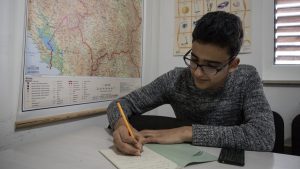
Serbia offers children public school education from the age of 5. Learn more:
PRIMARY AND SECONDARY EDUCATION
Serbia has universities and colleges where you may be able to study. Learn more:
Educational / Social Activities
Duolingo can teach you many languages’ basic grammar and vocabulary. It has English, French, Arabic and Farsi interfaces, among others.
Memrise is another language-learning website and app that can help you with vocabulary especially. It uses community-generated content. It is also available in English, French, Arabic and Farsi interfaces.
Other online learning platforms include:
You can also search for courses on MOOC.
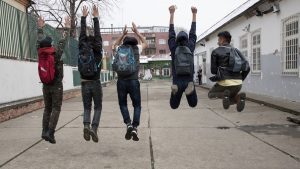
The Serbian higher education system conforms to European standards set forth in the Bologna Process and uses the European Credit Transfer System.
Serbian institutions award the traditional three tiers of degrees:
There are three types of higher education institutions in Serbia:
Some international universities exist as well.
Universities are the only institutions that offer all three tiers of higher education. Colleges may award both bachelor’s and specialist graduate degrees, but not master’s degrees or PhDs.
The academic year lasts 30 weeks and normally starts at the beginning of October, but it can vary by institution.
Most courses are taught in Serbian, but some programs and courses are available in English.
Higher education is not free in Serbia. The tuition fee can vary from to several hundred to several thousand euros per academic year.
If you have a certificate or other proof of previous education, you can start the recognition process at the ENIC/NARIC Centre in Belgrade. The recognition process can take more than a year.
You can apply to schools after ENIC/NARIC recognizes your certificate.
Every higher education institution in Serbia has an admission exam.
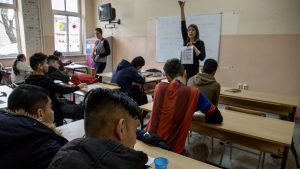
Children attend preschool from ages 5-7.
Children attend elementary school from ages 6.5-14.
Elementary school has 8 grades.
After elementary school, children may attend high school or grammar school.
In high school, children can learn a trade, like hairdressing, or profession, like medicine. They attend technical school from 14 to 16, 17 or 18, depending on their course.
At grammar school, children can focus on languages, mathematics or sports. They will also study other subjects. They attend grammar school from ages 14-18.
As an asylum-seeker or refugee, you cannot choose which type of secondary education you get or which school you attend. Serbian education authorities will place you in a school.
You can watch a video about unaccompanied and separated children going to school in Serbia here:
Elementary and high schools start September 1 and end in June.
The first half of the school year runs:
The second half of the school year runs:
There is no school on national holidays.
Yes:
Who can help you with enrollment?
You can ask UNICEF for help. If you cannot find any representative in your camp, ask another aid organization for help.
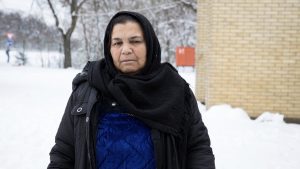
You have the right to medical care whether or not you are registered in a camp. No one may deny you access to medical care.
If you feel sick or are injured, you can get basic medical care in your camp. If you need serious medical help, the medical team or the Commissariat for Refugees and Migration will call an ambulance or take you to the hospital.
No. At least one aid worker has to come with you.
If you are under 18, a social worker, your temporary guardian, will come with you.
Hospital workers will ask your name and the reason you are there.
Go to the hospital when:
Go to the hospital for:
Go to the hospital for:
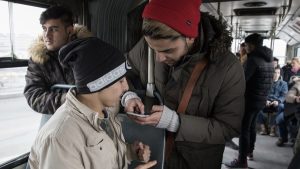
In Serbia, you can travel by bus between cities. Below are some websites where you can find direct bus lines between bigger cities.
You also can choose departure and arrival stations in many cities on the websites Polazak and Red voznje.
Bus tickets
The prices of your bus ticket depend on your destination and transportation company. The luggage fee is never included in the ticket price. It’s usually under 100 RSD (€0.84).
You can buy bus tickets:
At bigger bus stations, you have to buy a platform ticket or token that gives you access to the platforms, but not to board a bus. The prices of these range from 30 RSD-200 RSD (€0.25-€1.67), depending on the bus station.
You can take a train between all Serbia’s bigger cities.
Train tickets are usually a little more than half the price of bus tickets. Buy your train ticket at the railway station counter, if there is one. If you skip buying your ticket at the station, you will have to buy it from the conductor on the train, which may cost more.
Below is a list of main railway lines and ticket prices. These ticket prices are for second class on regional train. If you take the fast train or the international train, the prices will be higher.
If you want to see more options, please visit the Serbian Railways website and check direct trains and prices.
You can use public transport in all cities in Serbia. You may be asked to show your valid Certificate of Having Expressed the Intent to Seek Asylum.
If you want to get from one place to another within Belgrade, you can go via:
You can check the city lines on the website of Plan Plus (only in Serbian).
There are two accommodation centers in the Belgrade area. You can use public transportation from both to get to the city center and back.
Daily tickets
You can buy daily tickets directly from the driver. You have two options:
Monthly pass
You can buy a monthly pass at the counters of the public intercity transport company (in Serbian: GSP-Gradsko saobraćajno preduzeće).
The pass is 3,000-5,000 RSD (€25-€42) depending on the zone where you are and the place you want to reach in Belgrade.
Public transportation in Belgrade starts operating at 4 a.m. and stops at midnight, with some variations by line.
You can see more details on the website of the public intercity transport company (only in Serbian). Once you are on this page, go to the upper-right corner and choose the “LAT” button to see the text in Latin script.
Most public transportation in Nis starts operating at 4:20 a.m. and stops around 12:30 a.m, with some variations by line. You can see more details on the Plan Plus website.
A ticket for one continuous ride can be 60-100 RSD (€0.50-€1). You can buy your ticket from the bus driver.
Public transportation in Subotica starts operating at 4:40 a.m. and stops at 22:40 p.m, with some variations by line. You can see more details on the website of the Subotica-trans (once you are on this page, change the language to English).
A ticket for one ride is 90 RSD (€0.80). You can buy your ticket from the bus driver.
Info Park can buy your ticket to the asylum/reception center you are assigned to after you register at the police station, and also to the Subotica transit center if you are headed for admission to Hungary. Learn more about Info Park on our Service Map.
If you need to reach Krnjača or Bogovodja, the Crisis Response and Policy Centre can help you, but only if you have obtained your Certificate of Having Expressed the Intent to Seek Asylum and one of these is true:
Usually, the following people get discounts on bus travel:
The following people get discounts on train travel:
You have the right to travel by bus and train in Serbia if you buy a ticket. No company or person may deny you access to the bus or train. If you are denied access, you can complain to the Commissioner for the Protection of Equality.
Complaining will not help you directly, but it may help force the company to change its policies. To complain:
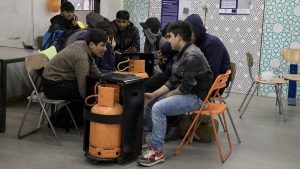
If you are in a camp and need help, SOS Children’s Villages is a good place to start.
If you are under 18 and traveling without your parents, you have the right to a temporary guardian. A temporary guardian will visit you within 24 hours after aid workers or the Commissariat for Refugees and Migration learn that you are in Serbia.
The temporary guardian is a social worker who:
Your guardian can help you find:
Your guardian also can help you:
You may have more than one temporary guardian in Serbia. You will get a new one every time you move to another city or town. The temporary guardian will not stay with you, but you can always ask for their help.
Once you express your intention to seek asylum in Serbia, authorities will direct you to a camp. Under the law, the camp must be an asylum center. Serbia’s asylum centers are in Krnjača, Bogovađa, Banja Koviljača, Sjenica and Tutin.
If social workers find that you meet certain criteria, they may place you in one of the 5 reception centers for unaccompanied refugee and migrant children in Serbia. These are:
Institute for Education of Children and Adolescents “Vasa Stajić” in Belgrade
Centre for the Protection of Infants, Children and Youth in Belgrade
Jesuit Refugee Service Integration House
Institute for Youth Education in Niš
Home for Children and Youth with Developmental Disabilities “Kolevka” in Subotica
In Subotica, refugees between 14 and 18 who are traveling without their families stay in Subotica Transit Center.
In some cases, you may enter foster care. Foster families provide accommodation, food, help and support.
Foster care ends when you:
You have the right to free primary and secondary education in Serbia. Learn more:
Young people traveling alone are particularly vulnerable. Here are some tips on how to stay safe and protect yourself from abusive people:
You can read more about unaccompanied and separated children’s rights in a Belgrade Centre for Human Rights report.
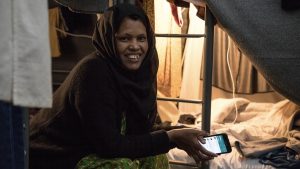
The organization Atina offers many services for women. Learn more:
Atina offers workshops on women’s empowerment in camps covering:
Atina offers informal education for women and girls in camps.
This service is for you if you are a victim of gender-based violence or human trafficking and you want to move to a safe place. It offers:
This service is for you if you are a victim of gender-based violence or human trafficking but don’t want to leave your current location. It offers:
Atina operates a bagel shop called Bagel in downtown Belgrade to benefit victims of human trafficking. If you want to stay in Serbia and work, you may be able to apply to work at the bagel shop. You will get:
You can find Atina:
You can call Atina for more information or in an emergency at: +381603220086
Girls and women may be in danger of gender-based violence, including:
Protect yourself and others. Here are some tips for staying safe: